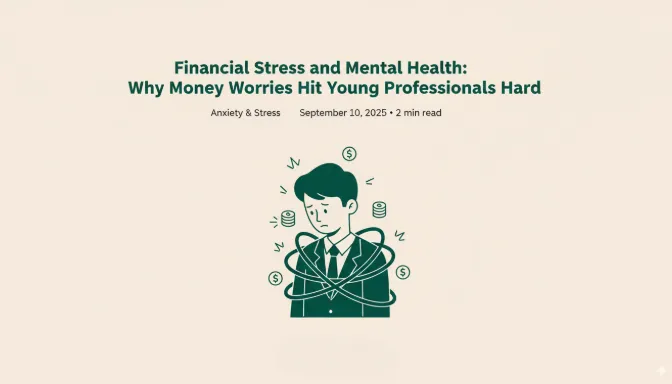
Why 50% of Young Professionals Report Anxiety — And What to Do About It
If you’re a young professional, you’re not imagining it — work and life feel harder than ever. Recent research shows that over 43% of young professionals screen positive for anxiety, and 31% for depression.
More than half report needing help for their mental health in the past year. That’s not a small issue. That’s a crisis.
So why is this happening? And more importantly, what can you do if you’re feeling the weight of it?
The Pressure of Work and Career
The transition from college to career is not smooth for many people. One national survey found that 38% of young workers believe their workplace negatively impacts their mental health.
In East Lansing, where many graduates from Michigan State University step straight into the workforce, the pressure to perform, succeed, and “make it” can feel overwhelming. You’re often managing a full-time job, student loans, and trying to build a social life — all at once.
Burnout Is Happening Earlier
It used to be that burnout was something people hit mid-career. Now? Nearly half of young workers report burnout symptoms.
Burnout isn’t just about long hours. It’s about being “always on,” never feeling caught up, and carrying the constant weight of responsibility. For many young adults in Michigan, burnout sets in before they even feel settled into their careers.
Financial Stress Makes It Worse
Another big piece of the puzzle: money. 46% of young professionals say their finances are always or often stressful. Among them, 61% rated their mental health as poor or fair.
Even in a state like Michigan, where cost of living is lower than on the coasts, young adults are feeling the squeeze from student loans, rising rent, and inflation. Financial stress and mental health often feed into each other, creating a cycle that feels hard to escape.
Loneliness and Isolation
Work isn’t just about tasks — it’s also about people. Yet 45% of young workers report feeling isolated at work .
That makes sense. In college, you’re surrounded by classmates, roommates, and friends. Post-grad life looks different. A lot of time is spent behind screens or in workplaces where deeper relationships are harder to form. That isolation fuels anxiety and depression.
What You Can Do
If you’re feeling the weight of anxiety, you’re not alone. And while you can’t erase every stressor, there are steps you can take to make life more manageable:
Set boundaries at work. Protect your evenings and weekends when possible.
Prioritize connection. Schedule time with friends, family, or community groups.
Take small financial steps. Even small budgeting changes can reduce stress over time.
Consider therapy. A therapist can help you sort through anxiety, build coping strategies, and give you a safe place to process stress.
Final Word
Anxiety among young professionals is real, widespread, and understandable. But it doesn’t have to define your life.
If you’re in East Lansing — or anywhere in Michigan — and this feels familiar, Grace Therapy provides a confidential, compassionate space to talk it through. With both in-person and online options, support is closer than you think.
👉 Schedule a free 15-minute intro call today and take the first step toward feeling lighter.
Sources:
Mary Christie Institute. The Mental Health and Wellbeing of Young Professionals Survey (2023).
American Psychiatric Association. Half of Young Workers Report Mental Health Challenges in the Workplace (2023).
The Global Statistics. Workplace Stress and Burnout in the U.S. (2024).
Forbes. 45% of Young Workers Struggle With Loneliness at Work (2024)


